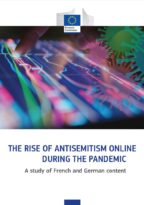Fonte:
https://op.europa.eu/en/
The rise of antisemitism online during the pandemic
A study of French and German content
Since the beginning of the Covid-19 pandemic, the economic uncertainties and anxieties around the virus have been weaponised by a broad range of extremists, conspiracy theorists and disinformation actors, who have sought to propagandise, radicalise and mobilise captive online audiences during global lockdowns. Antisemitic hate speech is often a common feature of these diverse threats, with dangerous implications for public safety, social cohesion and democracy. But the Covid-19 crisis has only served to exacerbate a worrying trend in terms of online antisemitism. A 2018 Fundamental Rights Agency survey on Experiences and Perceptions of Antisemitism among Jews in the EU found nearly nine in ten respondents considered online antisemitism a problem. Eight in ten encountered antisemitic abuse online. This report, conducted by the Institute for Strategic Dialogue (ISD), presents a data-driven snapshot of the proliferation of Covid-19 related online antisemitic content in French and German on Twitter, Facebook and Telegram. The study provides insight into the nature and volume of antisemitic content across selected accounts in France and Germany, analysing the platforms where such content is found, as well as the most prominent antisemitic narratives – comparing key similarities and differences between these different language contexts. The findings of this report draw on data analysis using social listening tools and natural language processing software, combined with qualitative analysis. Covering the period from January 2020 until March 2021 to build insights around the impact of the Covid-19 pandemic on online antisemitism, the Executive Summary International Holocaust Remembrance Alliance (IHRA) working definition of antisemitism was used to identify channels containing antisemitic content, before developing keyword lists to identify antisemitic expressions widely used on these channels.


